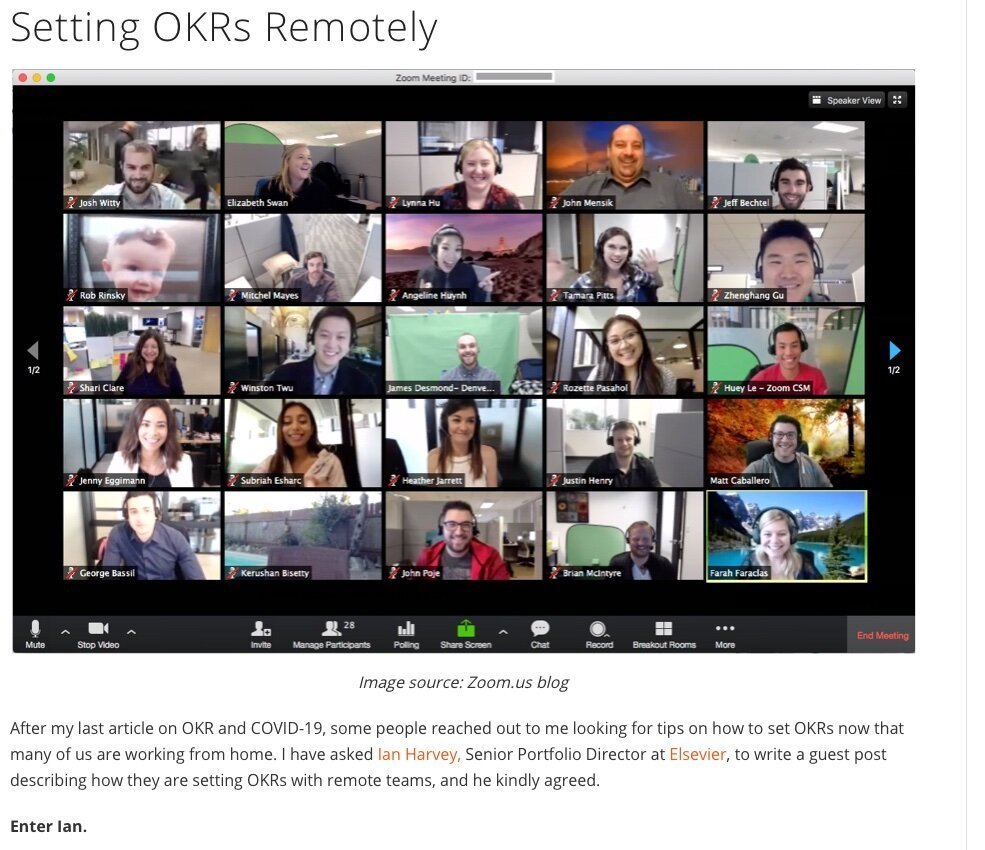The Outcomes Thinking Blog
This blog is regularly updated with articles related to OKRs. It will cover more advanced topics. For the basics start here
Join the mailing list to hear about new articles first.
OKRs and Performance Management
One of the few areas that most OKR practitioners agree on is that we shouldn't use OKRs as a direct measure for performance management. Despite this it remains an alluring proposition. This guide is aimed at leaders who set performance management policy.
Use the Five Whys to Test Strategy, Not to Fix Mistakes
The real value is in exposing the logic behind our bets. From exec teams to delivery teams, it helps make assumptions visible and testable
Change Management in OKR Implementations
Implementing Objectives and Key Results (OKRs) is not just using a new goal-setting framework, it is a strategic shift that impacts how an organisation prioritises, collaborates, and measures success.
Goals May Damage Your Health!
The goal part of a key result is often misused and is sometimes damaging.
Unless your key result represents a well understood threshold it is most likely a guess. It’s a guess about what is achievable.
What really matters is the connection to your strategy and your conviction to do your best.
Enabling Capabilities of OKR
You’re being misled about the reason for OKR failure. There are countless posts, threads and even blog series on why OKRs fail. Most of them focus on misinterpretations of the framework, but in my experience these kind of mistakes only cover a small proportion of OKR failures.
OKRs and Lots of Bad Advice
One of the most frustrating aspects of being an OKR consultant is the terrible advice I see shared. Much of the bad advice is seductive, promising an easy option. Thinking in terms of outcomes is tricky, but it's essential. Here are some examples of the bad advice I see.
Leading, lagging and proxy metrics
Leading, lagging and proxy metrics. There is a reason that Netflix spend up to 6 months identifying a metric. Metrics can have an enormous impact on your business. Leading metrics inform your decisions in a timeframe to power shorter feedback loops. They require more work to identify, but create far more usable insights.
The real reason OKR keeps failing
Most people think in terms of techniques, the cadence, the format of your KRs etc. In fact the web is full of articles about OKR mistakes. They all talk about techniques, but that’s a red herring.
Your OKR problem is a strategy problem
When I see a product team ‘starting from scratch’ with their OKRs each quarter, it’s a sure sign that there is an absence of product strategy.
Considering individual OKRs? You have a coaching gap, not a goals gap.
Adopting individual OKRs is a mistake that threatens alignment, is time consuming and distracts from the real job of the manager. Find out why.
OKRs v KPIs - How they work together
Dogma has crept in to the explanation of Key Results and KPIs. The reality is much simpler and more helpful. This brief article explains why.
Start with why - Leadership and OKR
Outcomes based planning is at its core a discipline that depends on empowerment and devolved decision making. Despite this, great leadership is critical to the successful adoption of the framework. This article will share the leadership behaviours that in my experience, have the biggest impact on success.
OKR and Performance Management
Love and marriage, macaroni and cheese, appraisal time and miserable managers. Some things just go together, so how about OKRs and Performance Management? This article will share my findings on how to successfully blend OKRs and performance management.
What Problems are OKR Solving?
OKRs receive a lot of bad press and bad tweets. Part of this problem is the range of bad OKR advice, but organisations are often confused as to problem they are trying to solve. This article highlights a few of the key reasons for implementing OKRs.
Setting OKRs Remotely
The tooling has improved since I wrote this post, but the principles remain the same. Good facilitation skills are an important part of your OKR setting sessions.
What are OKRs?
OKRs - Objectives and Key Results is an approach to setting goals that helps organisations connect strategy to execution. OKR was created by Andy Grove at Intel and popularised when John Doerr shared the framework with Google. Now it is widely used in technology organisations and beyond.
Why Use OKRs
Introduction
OKR is a framework that offers significant benefits when used for the right opportunities. In the simplest terms, OKR helps us achieve our most important outcomes because it encourages certain kinds of behaviour.
How to Set OKRs
This article aims to help you plan and run an OKR setting session. Meetings are expensive and one of the most significant sources of wasted time. They're also the point where we make some of our most critical decisions.
Good meetings are a little like a product. Good planning, design and execution are rewarded.



















